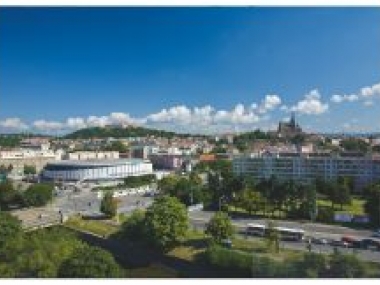Special Report: Brno - The Road to More Cooperation Among Municipalities
Edited on
09 October 2017Joining Forces is one of the six URBACT projects that came to completion in May. For a period of two years, eight cities worked together on the issue of why and how to create governance at city-region level. For Lille and Brussels, this project was an opportunity to take an approach that was already well-established further. For Brno, in the Czech Republic, it served as a trigger and springboard towards cooperation among the other cities in the municipal area. Marie Zezůlková, project leader with the municipality of Brno, recounts this experience.

For Brno, the second most populated city in the Czech republic with 400,000 inhabitants, URBACT's Joining Forces project caused a mini cultural revolution. 'Before,' explains Marie Zezůlková, 'there was no cooperation at all between the cities in our municipal area, which has about 650,000 inhabitants. The administrative system in the Czech Republic, for that matter, has no legal framework that enables municipalities to work together.' Furthermore, local initiatives receive little encouragement in this country where the reflexes of centralization inherited from the Communist era are still present.
The municipality of Brno was also aware that there were political obstacles on a local level and took part in the Joining Forces project with a realistic and progressive goal of making its URBACT Local Action Plan the seedbed of future cooperation, particularly focused on topics that were identified as priorities, such as local planning and controlling suburbanization, the municipal area's main challenge today.
The municipality of Brno was a driving force in convincing other autonomous governance entities of the interest of the project. In putting together its eleven-member URBACT Local Support Group, 'certain small municipalities feared they would be crushed by Brno and would lose their identity. We had to emphasise that the project was not meant to pit one municipality against another, but that it was a collective effort beneficial to all and that would make it possible to carry out large projects and attract investors'. In this context, the successful experience of other Joining Forces partner cities, 'especially Lille, Eindhoven and Brussels', where interurban cooperation is already a reality, was and is still a decisive argument. 'For us, this knowledge of what is being done elsewhere in Europe is a real tool for political persuasion.'
First accomplishment: a shared strategic document to serve as the basis for future cooperation
The focal point of Brno's URBACT Local Action Plan—'cooperating to establish strategic documents and develop shared projects'—enabled the identification of action plans to implement in the future. The group used the existing master plans for Brno and the South Moravia Region, upon which the municipality is dependent, as a basis.
In order to develop its Local Action Plan, which was presented at the end of May, Brno also took a lot of inspiration from the good practices implemented by other Joining Forces cities, which had been the topics of seven seminars in 2008 and 2009:
 Download EINDHOVEN - Seminar Working Document (1.2 MB)
Download EINDHOVEN - Seminar Working Document (1.2 MB) Download FLORENCE - Seminar Working Document (728.55 KB)
Download FLORENCE - Seminar Working Document (728.55 KB) Download SEVILLE - Seminar Working Document (1.72 MB)
Download SEVILLE - Seminar Working Document (1.72 MB) Download BRNO - Seminar Working Document (1.65 MB)
Download BRNO - Seminar Working Document (1.65 MB) Download KRAKOW - Seminar Working Document (1.46 MB)
Download KRAKOW - Seminar Working Document (1.46 MB) Download BURGAS - Seminar Working Document (831.35 KB)
Download BURGAS - Seminar Working Document (831.35 KB) Download BRUSSELS - Seminar Working Document (1.3 MB)
Download BRUSSELS - Seminar Working Document (1.3 MB)
Today, the Joining Forces project has officially ended, yet the Local Support Group is still active and continues to enrich the strategic document.
Joining Forces toppled the main obstacles to cooperation
The road to the first hands-on actions will perhaps still be long, but Marie Zezůlková is confident that the project will last in time: 'All the members of the Local Support Group have expressed the desire to continue working together and, thanks to the URBACT project, we have built a foundation for more cooperation in the future. Everything is ready so that after the municipal elections next month, the political power in place will be able to formally pursue this platform, which will undoubtedly take the form of an association of municipalities.'
Most of all, Joining Forces enabled Brno and the neighbouring municipalities to work more closely with the South Moravia Region, which participated in the Local Support Group: 'not only is the region now accepting our local initiatives, but it is encouraging them, which is a success that goes well beyond our expectations.'
A trailblazing initiative in the Czech Republic
Brno is a pioneer in its country and is convinced that this locally decided municipal area project that has support of the region will serve as an example for other Czech cities that are in a similar situation. Cooperation among municipalities will, for that matter, be on the agenda of the national Cities 2020 urban planning conference, which will take place in Brno on September 30. 'Our Joining Forces partners Brussels, Eindhoven and Lille will attend and this will be an opportunity to introduce Czech cities to this approach.'
Read more:
- Joining Forces – URBACT website
- Conclusion of 6 URBACT projects: Final publications now available ! – URBACT website
Submitted by admin on




